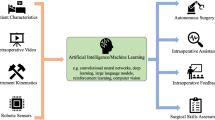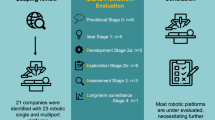Abstract
Background
While robotic-assisted operations have become more prevalent, many general surgery residencies do not have a formal robotic training curriculum. We sought to ascertain how well current general surgery training permits acquisition of robotic skills by comparing robotic simulation performance across various training levels.
Study design
Thirty-six participants were categorized by level of surgical training: eight medical students (MS), ten junior residents (JR), ten mid-level residents (MLR), and eight senior residents (SR). Participants performed three simulation tasks on the da Vinci ® Skills Simulator (MatchBoard, EnergyDissection, SutureSponge). Each task’s scores (0–100) and cumulative scores (0–300) were compared between groups.
Results
There were no differences in sex, hand dominance, video gaming history, or prior robotic experience between groups; however, SR was the oldest (p < 0.001). The median overall scores did not differ: 188 (84–201) for MS, 183 (91–234) for JR, 197 (153–218) for MLR, and 205 (169–229) for SR (p = 0.14). The median SutureSponge score was highest for SR (61, range 39–81) compared to MS (43, range 26–61), JR (43, range 11–72), and MLR (55, range 36–68) (p = 0.039). However, there were no significant differences in MatchBoard (p = 0.27) or EnergyDissection (p = 0.99) scores between groups. There was a positive correlation between SutureSponge score and number of laparoscopic cases logged (p = 0.005, r 2 = 0.21), but this correlation did not exist for the MatchBoard or EnergyDissection tasks. Lastly, there was no correlation between total lifetime hours of video gaming and overall score (p = 0.89, R 2 = 0.0006).
Conclusions
Robotic skillsets acquired during general surgery residency show minimal improvement during the course of training, although laparoscopic experience is correlated with advanced robotic task performance. Changes in residency curricula or pursuit of fellowship training may be warranted for surgeons seeking proficiency.



Similar content being viewed by others
References
Washburn EE, Cohen SL, Manoucheri E, Zurawin RK, Einarsson JI (2014) Trends in reported resident surgical experience in hysterectomy. J Minim Invasive Gynecol 21:1067–1070. doi:10.1016/j.jmig.2014.05.005
Madeb R, Golijanin D, Knopf JK, Kowalczyk J, Feng C, Rashid H, Wu G, Eichel L, Valvo JR (2011) The impact of robotics on treatment of localized prostate cancer and resident education in Rochester, New York. J Endourol 25:573–577. doi:10.1089/end.2010.0498
Farivar BS, Flannagan M, Leitman IM (2014) General surgery residents’ perception of robot-assisted procedures during surgical training. J Surg Educ. doi:10.1016/j.jsurg.2014.09.008
Stegemann AP, Ahmed K, Syed JR, Rehman S, Ghani K, Autorino R, Sharif M, Rao A, Shi Y, Wilding GE, Hassett JM, Chowriappa A, Kesavadas T, Peabody JO, Menon M, Kaouk J, Guru KA (2013) Fundamental skills of robotic surgery: a multi-institutional randomized controlled trial for validation of a simulation-based curriculum. Urology 81:767–774. doi:10.1016/j.urology.2012.12.033
Davis JW, Kamat A, Munsell M, Pettaway C, Pisters L, Matin S (2010) Initial experience of teaching robot-assisted radical prostatectomy to surgeons-in-training: can training be evaluated and standardized? BJU Int 105:1148–1154. doi:10.1111/j.1464-410X.2009.08997.x
Rashid HH, Leung YYM, Rashid MJ, Oleyourryk G, Valvo JR, Eichel L (2006) Robotic surgical education: a systematic approach to training urology residents to perform robotic-assisted laparoscopic radical prostatectomy. Urology 68:75–79. doi:10.1016/j.urology.2006.01.057
Schreuder HWR, Wolswijk R, Zweemer RP, Schijven MP, Verheijen RHM (2012) Training and learning robotic surgery, time for a more structured approach: a systematic review. BJOG Int J Obstet Gynaecol 119:137–149. doi:10.1111/j.1471-0528.2011.03139.x
Seymour N, Gallagher A, Roman S, O’Brien M, Bansal V, Andersen D, Satava R (2002) Virtual reality training improves operating room performance: results of a randomized, double-blinded study. Ann Surg 236:458–463. doi:10.1097/01.SLA.0000028969.51489.B4
Liss MA, Abdelshehid C, Quach S, Lusch A, Graversen J, Landman J, McDougall EM (2012) Validation, correlation, and comparison of the da Vinci trainer(™) and the daVinci surgical skills simulator(™) using the Mimic(™) software for urologic robotic surgical education. J Endourol 26:1629–1634. doi:10.1089/end.2012.0328
Seymour NE (2008) VR to OR: a review of the evidence that virtual reality simulation improves operating room performance. World J Surg 32:182–188. doi:10.1007/s00268-007-9307-9
Alzahrani T, Haddad R, Alkhayal A, Delisle J, Drudi L, Gotlieb W, Fraser S, Bergman S, Bladou F, Andonian S, Anidjar M (2013) Validation of the da Vinci surgical skill simulator across three surgical disciplines: a pilot study. J Can Urol Assoc 7:E520–E529. doi:10.5489/cuaj.419
Gomez PP, Willis RE, Van Sickle KR (2014) Development of a virtual reality robotic surgical curriculum using the da Vinci Si surgical system. Surg Endosc. doi:10.1007/s00464-014-3914-y
Bric J, Connolly M, Kastenmeier A, Goldblatt M, Gould JC (2014) Proficiency training on a virtual reality robotic surgical skills curriculum. Surg Endosc 28:3343–3348. doi:10.1007/s00464-014-3624-5
Connolly M, Seligman J, Kastenmeier A, Goldblatt M, Gould JC (2014) Validation of a virtual reality-based robotic surgical skills curriculum. Surg Endosc 28:1691–1694. doi:10.1007/s00464-013-3373-x
Panait L, Shetty S, Shewokis PA, Sanchez JA (2014) Do laparoscopic skills transfer to robotic surgery? J Surg Res 187:53–58. doi:10.1016/j.jss.2013.10.014
Hung AJ, Zehnder P, Patil MB, Cai J, Ng CK, Aron M, Gill IS, Desai MM (2011) Face, content and construct validity of a novel robotic surgery simulator. J Urol 186:1019–1024. doi:10.1016/j.juro.2011.04.064
Lyons C, Goldfarb D, Jones SL, Badhiwala N, Miles B, Link R, Dunkin BJ (2013) Which skills really matter? Proving face, content, and construct validity for a commercial robotic simulator. Surg Endosc 27:2020–2030. doi:10.1007/s00464-012-2704-7
Toro JP, Lin E, Patel AD (2014) Review of robotics in foregut and bariatric surgery. Surg Endosc. doi:10.1007/s00464-014-3646-z
Papanikolaou IG (2014) Robotic surgery for colorectal cancer: systematic review of the literature. Surg Laparosc Endosc Percutan Tech 24:478–483. doi:10.1097/SLE.0000000000000076
Boggi U, Amorese G, Vistoli F, Caniglia F, De Lio N, Perrone V, Barbarello L, Belluomini M, Signori S, Mosca F (2014) Laparoscopic pancreaticoduodenectomy: a systematic literature review. Surg Endosc. doi:10.1007/s00464-014-3670-z
Peters JH, Fried GM, Swanstrom LL, Soper NJ, Sillin LF, Schirmer B, Hoffman K (2004) Development and validation of a comprehensive program of education and assessment of the basic fundamentals of laparoscopic surgery. Surgery 135:21–27. doi:10.1016/S0039-6060(03)00156-9
Jenison EL, Gil KM, Lendvay TS, Guy MS (2012) Robotic surgical skills: acquisition, maintenance, and degradation. JSLS J Soc Laparoendosc Surg 16:218–228. doi:10.4293/108680812X13427982376185
Guseila LM, Saranathan A, Jenison EL, Gil KM, Elias JJ (2014) Training to maintain surgical skills during periods of robotic surgery inactivity. Int J Med Robot Comput Assist Surg 10:237–243. doi:10.1002/rcs
Rosser JC, Lynch PJ, Cuddihy L, Gentile DA, Klonsky J, Merrell R (2007) The impact of video games on training surgeons in the 21st century. Arch Surg 142:181–186. doi:10.1001/archsurg.142.2.186
Lynch J, Aughwane P, Hammond TM (2010) Video games and surgical ability: a literature review. J Surg Educ 67:184–189. doi:10.1016/j.jsurg.2010.02.010
Harper JD, Kaiser S, Ebrahimi K, Lamberton GR, Hadley HR, Ruckle HC, Baldwin DD (2007) Prior video game exposure does not enhance robotic surgical performance. J Endourol 21:1207–1210. doi:10.1089/end.2007.9905
Palter V, Grantcharov T (2014) Individualized deliberate practice on a virtual reality simulator improves technical performance of surgical novices in the operating room: a randomized controlled trial. Ann Surg 259:443–448. doi:10.1097/SLA.0000000000000254
Acknowledgments
There are no additional acknowledgements to report.
Disclosures
Drs. Finnerty, Afaneh, Aronova, Fahey, and Zarnegar have no conflicts of interest or financial ties to disclose.
Author information
Authors and Affiliations
Corresponding author
Rights and permissions
About this article
Cite this article
Finnerty, B.M., Afaneh, C., Aronova, A. et al. General surgery training and robotics: Are residents improving their skills?. Surg Endosc 30, 567–573 (2016). https://doi.org/10.1007/s00464-015-4240-8
Received:
Accepted:
Published:
Issue Date:
DOI: https://doi.org/10.1007/s00464-015-4240-8




